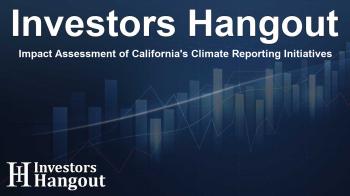Impact Assessment of California's Climate Reporting Initiatives

Understanding California's Climate Reporting Landscape
California is known for taking significant strides in environmental policies and climate reporting standards. With the proposed Senate Bill 755 (SB 755), stakeholders are closely analyzing its implications for the state's suppliers. This innovative research conducted by Governance & Accountability Institute (G&A) highlights the current readiness of major suppliers to align with the evolving climate regulations.
Insights from the Recent Study
The report titled "California Supply Chain: Current Practices & Trends in Climate Disclosure" serves as a crucial benchmark that evaluates how leading suppliers to California are adapting to the state's ambitious climate strategy. This initiative aims for carbon neutrality by 2045, increasing the importance for suppliers to disclose their environmental practices. Despite the critical nature of these reports, most of California's top suppliers fall short of disclosing essential climate-related information.
Key Findings Unveiled
The analysis reveals startling statistics regarding the climate reporting function among California’s suppliers. A mere 25% of suppliers are currently disclosing their Scopes 1 and 2 emissions, and only 18% report on Scope 3 emissions, which represents the most significant portion of many companies’ carbon footprints. These figures indicate an extensive gap in transparency that might hinder efforts to achieve California's climate objectives.
Assessing Supplier Preparedness
In assessing the overall readiness of suppliers, the findings point to a notable lack of preparedness for compliance with SB 755. Only 10% of suppliers have obtained third-party assurance for their greenhouse gas (GHG) emissions. Additionally, merely 11% have set science-based targets for emissions reduction. With such low rates of voluntary reporting, there’s a pressing need for state agencies, procurement teams, and policymakers to proactively guide suppliers toward compliance.
The Need for Comprehensive Climate Risk Assessments
A critical lacuna identified in the report is the absence of climate risk assessments among suppliers. Only 17% of respondents have conducted assessments aligned with the Task Force on Climate-related Financial Disclosures (TCFD) guidelines. This highlights a significant opportunity for improvement, as suppliers will need to move beyond basic disclosures to include a comprehensive understanding of their exposure to climate risks.
Establishing a Baseline for Future Progress
As California's climate regulatory framework evolves, the report provides a foundational baseline for assessing progress in climate disclosures. With SB 755's implementation, suppliers will be better equipped to navigate these new regulations. By updating this analysis annually, stakeholders can track improvements and identify remaining gaps in compliance.
Implications for Various Stakeholders
For procurement teams, the report serves as a vital tool for measuring supplier progress and adapting engagement strategies. Suppliers can utilize this data to benchmark their practices against industry peers, facilitating targeted improvements. Additionally, policymakers are positioned to monitor the effectiveness of enacted climate laws and make necessary adjustments to support better compliance.
Contributions from Key Stakeholders
Industry leaders have echoed the relevance of this study. Louis Coppola, CEO & Co-Founder at G&A Institute, emphasizes the importance of aligning supplier readiness with climate disclosure expectations. Ceres, an environmental non-profit, also stresses that suppliers play a crucial role in helping California meet its ambitious climate targets.
What Lies Ahead?
As SB 755 is set to draw more suppliers into California’s climate disclosure ecosystem, the insights gathered in this research will remain invaluable. Ongoing assessments of supplier performance will foster greater accountability, ensuring that businesses are prepared for increasing transparency demands.
Frequently Asked Questions
What is the significance of SB 755?
SB 755 aims to enhance climate disclosure requirements for suppliers, pushing them to report climate-related financial risks and greenhouse gas emissions.
How does the report impact suppliers?
The report outlines current disclosure practices, highlighting areas where suppliers are lacking and encouraging them to improve transparency and accountability.
What are Scope 1, 2, and 3 emissions?
Scope 1 emissions are direct emissions from owned or controlled sources, Scope 2 are indirect emissions from the generation of purchased energy, and Scope 3 includes all other indirect emissions in a company's value chain.
Why is it important for suppliers to conduct climate risk assessments?
Climate risk assessments enable suppliers to identify vulnerabilities and risks linked to climate change, aiding in compliance and strategic planning.
How can stakeholders leverage this report?
Stakeholders can utilize the report to gauge supplier compliance, adjust strategies for engagement, and inform decision-making related to sustainability practices.
About The Author
Contact Kelly Martin privately here. Or send an email with ATTN: Kelly Martin as the subject to contact@investorshangout.com.
About Investors Hangout
Investors Hangout is a leading online stock forum for financial discussion and learning, offering a wide range of free tools and resources. It draws in traders of all levels, who exchange market knowledge, investigate trading tactics, and keep an eye on industry developments in real time. Featuring financial articles, stock message boards, quotes, charts, company profiles, and live news updates. Through cooperative learning and a wealth of informational resources, it helps users from novices creating their first portfolios to experts honing their techniques. Join Investors Hangout today: https://investorshangout.com/
The content of this article is based on factual, publicly available information and does not represent legal, financial, or investment advice. Investors Hangout does not offer financial advice, and the author is not a licensed financial advisor. Consult a qualified advisor before making any financial or investment decisions based on this article. This article should not be considered advice to purchase, sell, or hold any securities or other investments. If any of the material provided here is inaccurate, please contact us for corrections.

